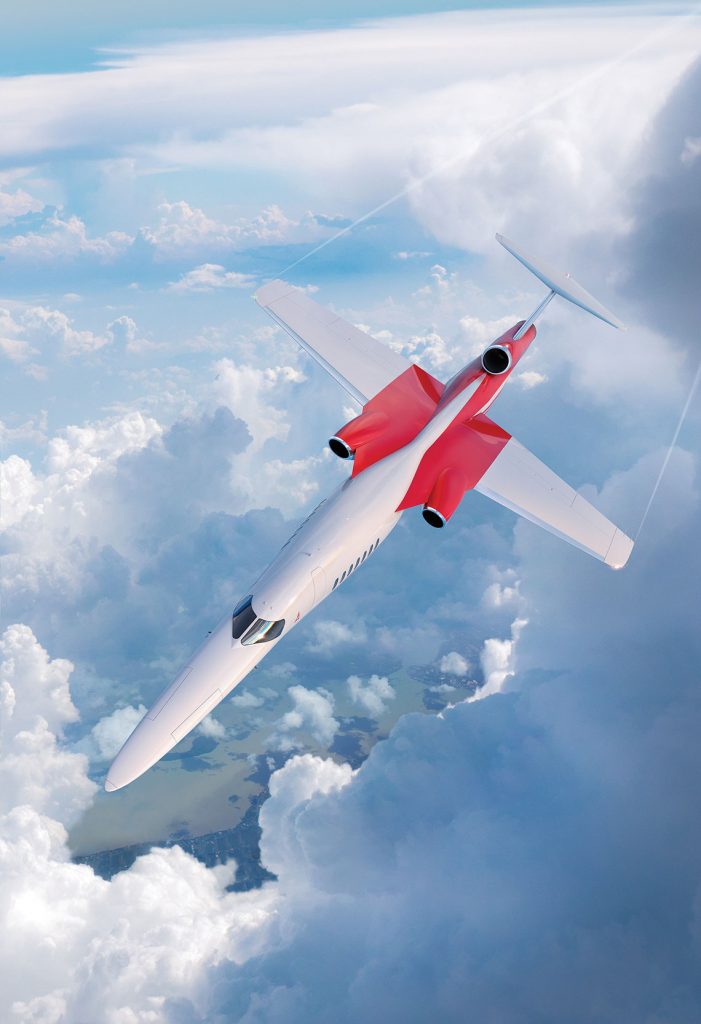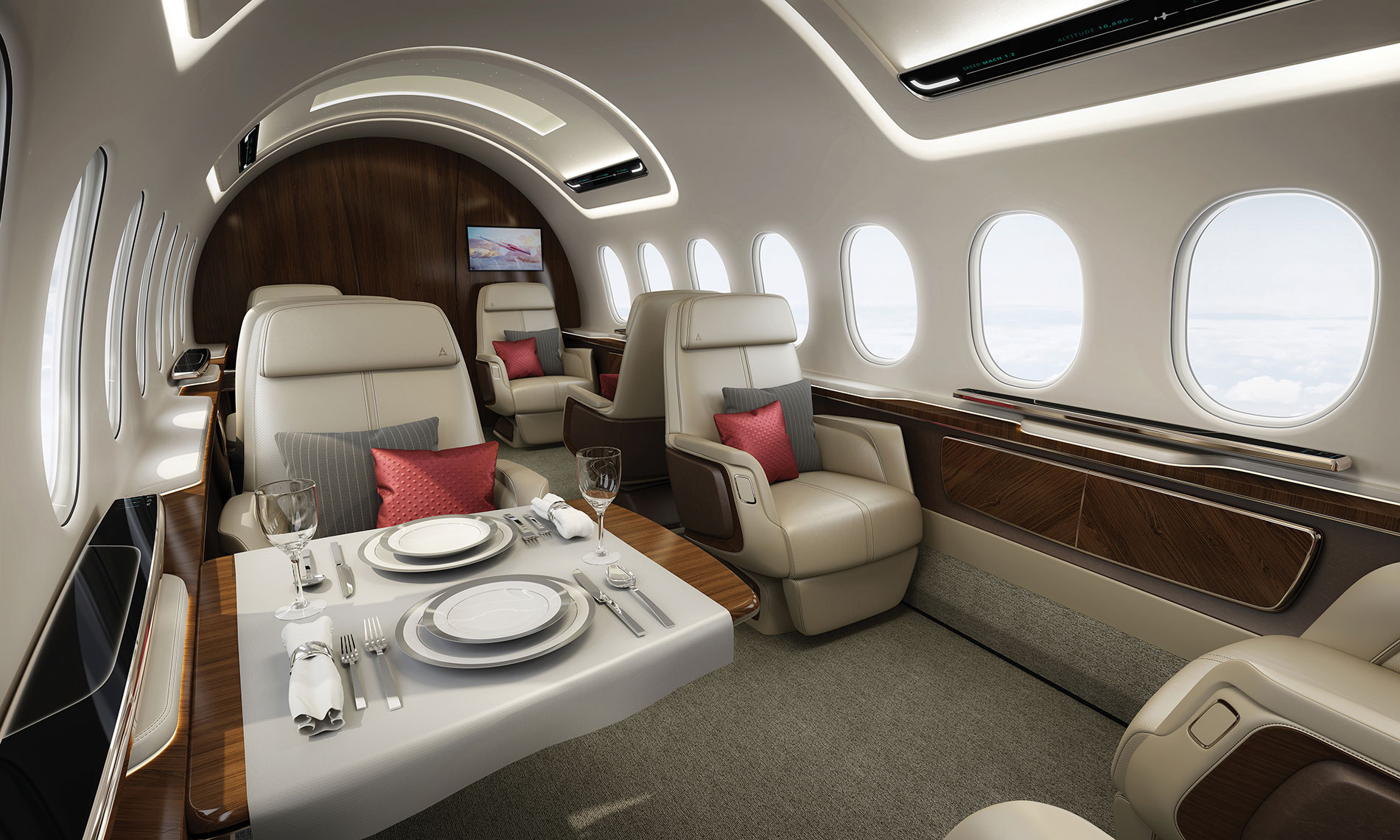Kick off your shoes, stretch out on the couch, adjust your pillows and curl up with your favorite book. Check the console. It’s a balmy 82 degrees in Venice. Looking down on the endless clouds below racing by at 1,000 miles per hour as you cross the Atlantic three hours faster than the average commuter? Now that’s luxury.
By 2023, this could be the average day-to-day life of elite businessmen and vacationers thanks to the AS2 business jet. As the world’s fastest civilian airplane moves from the distant horizon to the foreground of private travel, this technology will break quite a few more barriers than sound alone.
 Aerion Supersonic has teamed up with Lockheed Martin and GE Aviation in an effort to revolutionize the aeronautic industry. They’ve set their sights on private and charter travel—planning to release the fastest luxury cruiser in history—the AS2 business jet. Like their new plane, they have sped past the notion that the sky has ever been a limit on technological progress. Over the past 20 years, Aerion has worked with NASA, The European Transonic Wind Tunnel, Sandia National Labs and other organizations to take major steps forward in high-speed aeronautics. Over the years, Aerion has patented dozens of technologies. When they eventually unveil the AS2, they will have set loose a state-of-the-art plane with aerodynamic and engine technology second to none. With first flight aiming at 2023, the aircraft will hit the general market in 2025.
Aerion Supersonic has teamed up with Lockheed Martin and GE Aviation in an effort to revolutionize the aeronautic industry. They’ve set their sights on private and charter travel—planning to release the fastest luxury cruiser in history—the AS2 business jet. Like their new plane, they have sped past the notion that the sky has ever been a limit on technological progress. Over the past 20 years, Aerion has worked with NASA, The European Transonic Wind Tunnel, Sandia National Labs and other organizations to take major steps forward in high-speed aeronautics. Over the years, Aerion has patented dozens of technologies. When they eventually unveil the AS2, they will have set loose a state-of-the-art plane with aerodynamic and engine technology second to none. With first flight aiming at 2023, the aircraft will hit the general market in 2025.
Even someone who knows nothing about planes can see its innovative design. With two engines along the wings and a third centered on the upraised tail, the AS2 looks like it’s been lifted straight out of a 1950s science-fiction novel. Darting around as quick as a hummingbird with its sleek symmetry and long beak-like nose, the plane reaches an astounding Mach 1.4, or in layman’s terms, 1.4 times faster than the speed of sound (and over 1,000 miles per hour).
The three parallel, crimson racing stripes along the fuselage let even the most novice see the AS2’s brash thesis statement—speed first, the competition second. It can reach distances within a 4,200 nautical mile range while voyaging at that speed. When flying at Mach 0.95, the plane’s reach extends to 5,400 miles. The AS2 moves 60 percent faster than the private jets of today. It will save travelers up to three hours when crossing the Atlantic and more than five hours when crossing the Pacific. A trip from Tokyo to San Francisco? Cut three hours. London to Sydney? Four hours saved. New York to London? Two extra hours for business or vacation time.
The jet also stands up to scrutiny from industry experts. Aerion’s work with Supersonic Natural Laminar Flow (SNLF) materials has changed how commercial, military and private airplanes achieve Mach speeds. Since 2003, the company has steadily built what may now be considered the largest repository of information on SNLF technology. The company also developed full-airframe optimization software, allowing them to create the drag reducing shape that makes the plane so fast. Putting traditional wing models to the side, they’ve created a thin wing and horizontal stabilizer that reduces drag by about 70 percent in comparison to delta wing designs. Finally, Aerion constructed the plane with carbon fiber composite structures and titanium for its interior and edges—materials utilized in today’s fighter jets.
The AS2 does not compromise its luxury amenities in exchange for its speed, making it ideal for international business or spur of the moment vacations. With a length of 170 feet and a wingspan of 77 feet, the plane accommodates a 30-foot cabin with five customizable interiors. The “Aft Stateroom” design has five leather recliners, a corner television/entertainment center and room for a couch, bed or combination piece. For business, the “Double Club” comes with eight recliners that make mobile meetings or in-transit planning a (1,000 miles per hour) breeze. Customers may choose to include a couch, allowing room for 11 to sit and relax in comfort. For those looking for pleasure over work, the “Entertainment Center with Large Credenza” design offers an extended television space, a bookshelf and cabinets to hold a variety of electronics and entertainment. Every design comes with a large galley for plenty of drink and dining options.
 A luxury lavatory and walk-in baggage area will make you forget you’ve been on a plane at all. Naturally, with the AS2’s focus on quality, craftsmanship, technology and aesthetic, Aerion Supersonic allows clients to customize the plane’s interior to match their desires and specifications.
A luxury lavatory and walk-in baggage area will make you forget you’ve been on a plane at all. Naturally, with the AS2’s focus on quality, craftsmanship, technology and aesthetic, Aerion Supersonic allows clients to customize the plane’s interior to match their desires and specifications.
In 2015, rough estimates placed the jet’s value at $120 million. With inflation and demand, the 2025 retail price will most likely increase. Even with the hefty price tag, Aerion has lined up pre-orders from clientele who know the value of their time in today’s business.
With the plane’s speed and range of travel, it seduces us into false assertions about what makes it so special. Who wouldn’t mistakenly claim that its ability to shorten, to cut and to race at high speeds remain its most important qualities. In reality, the plane’s ability to do the reverse make it spectacular. It creates more time, lengthens experiences and allows more space to live in earnest. It turns the waiting hours into productive ones. It lengthens the time we have outside its cabin. By saving multiple hours in a single flight, the AS2 can potentially give us days, even weeks of extra time over the plane’s lifespan. The same days we spend with family and friends that would otherwise have been held hostage by business and downtime. By accelerating past the empty spaces that we’ll never get back, the jet maximizes the moments that matter most to us. When looking back on a lifetime, the value of such technology might just be priceless.
The post Supersonic Renaissance: The Aerion AS2 appeared first on VUE magazine.
